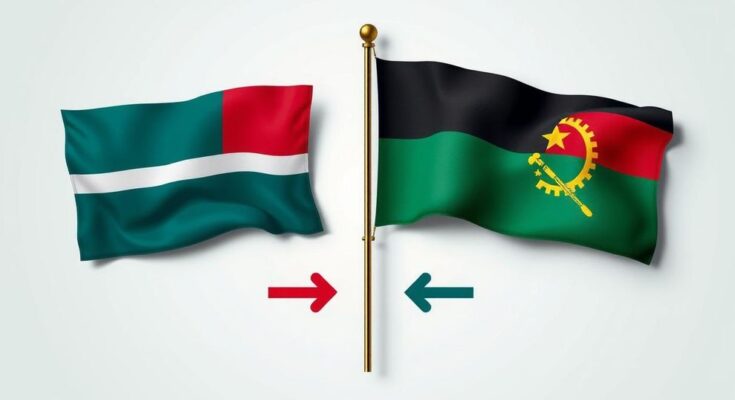Tension arose between Tanzania’s ACT-Wazalendo and the ruling CCM over a blockade incident in Angola. ACT leaders allege misrepresentation by CCM officials. In response, CCM leaders deny government involvement and place blame on the opposition’s failure to follow protocols. Calls for government accountability and clarification persist amidst fears concerning democratic leadership within the African Union.
The ongoing tension between Tanzania’s opposition party, ACT-Wazalendo, and the ruling Chama cha Mapinduzi (CCM) escalated after a blockage incident at Quatro de Fevereiro Airport in Angola. ACT-Wazalendo Chairman Masoud Othman has accused CCM leaders of misrepresenting the situation and undermining the Tanzanian government’s image. He called for accountability from the authorities regarding the accusations made by senior CCM officials.
Masoud Othman specifically targeted CCM Vice-Chairman Stephen Wasira and Central Committee Secretary Hamis Mbetto. The blockade occurred when Othman and fellow opposition leaders aimed to attend the African Democracy Forum (PAD). The ACT-Wazalendo immediately condemned the event, urging the Tanzanian government to address the incident formally.
In response to Othman’s claims, Wasira stated that the opposition leaders should not blame the Tanzanian government since the airport is managed by Angola’s authorities. He indicated that there might be various reasons for their blockage while questioning whether the Tanzanian government had any control over Angola’s operations. Mbetto echoed similar sentiments, asserting that Othman’s delegation did not adhere to the proper procedures, which resulted in their blockade.
Othman countered these claims, affirming that all travel protocols were duly followed and that prior approval had been obtained from Zanzibar’s President, Dr. Hussein Mwinyi. He emphasized that all required clearances were arranged well in advance. Othman further dismissed the notion that the Tanzanian government played any role in the blockage, stressing it was related to the political landscape in Angola.
Hamis Mbetto rebuffed accusations against himself and Wasira, insisting he had committed no wrongdoing. He challenged Othman to ponder why his convoy faced issues when others did not, highlighting the historical ease with which previous leaders traveled abroad. Mbetto reiterated that if one follows the right procedures, blockage should not occur.
Othman’s accusations were further met with skepticism from Mbetto, who pointed out that Othman has previously made incendiary statements against the government without repercussions. He insisted on the need for Othman to reflect on his conduct. Dorothy Semu, an ACT-Wazalendo leader, expressed disappointment with the government’s silence regarding the blockage, calling for clarification from the Tanzanian Ambassador to Angola.
Furthermore, Semu raised concerns about the appropriateness of Angola’s President leading the African Union (AU) amid issues concerning democracy and governance. She urged a reevaluation of leadership roles within the AU to align with democratic principles. Semu concluded by highlighting the significance of the PAD Forum, which addresses the future of African political engagement.
The incident involving the blockage of opposition leaders in Angola has sparked allegations and counterclaims between the ACT-Wazalendo and CCM parties. While Othman insists that all proper protocols were followed for their travel, CCM leaders argue that the opposition is misrepresenting the truth. The situation underscores the complex dynamics of political relationships in the region and emphasizes calls for clarity and accountability from the Tanzanian government regarding foreign diplomatic engagement. Overall, the discourse illustrates the ongoing challenges within Tanzanian politics related to governance and opposition rights.
Original Source: www.thecitizen.co.tz




